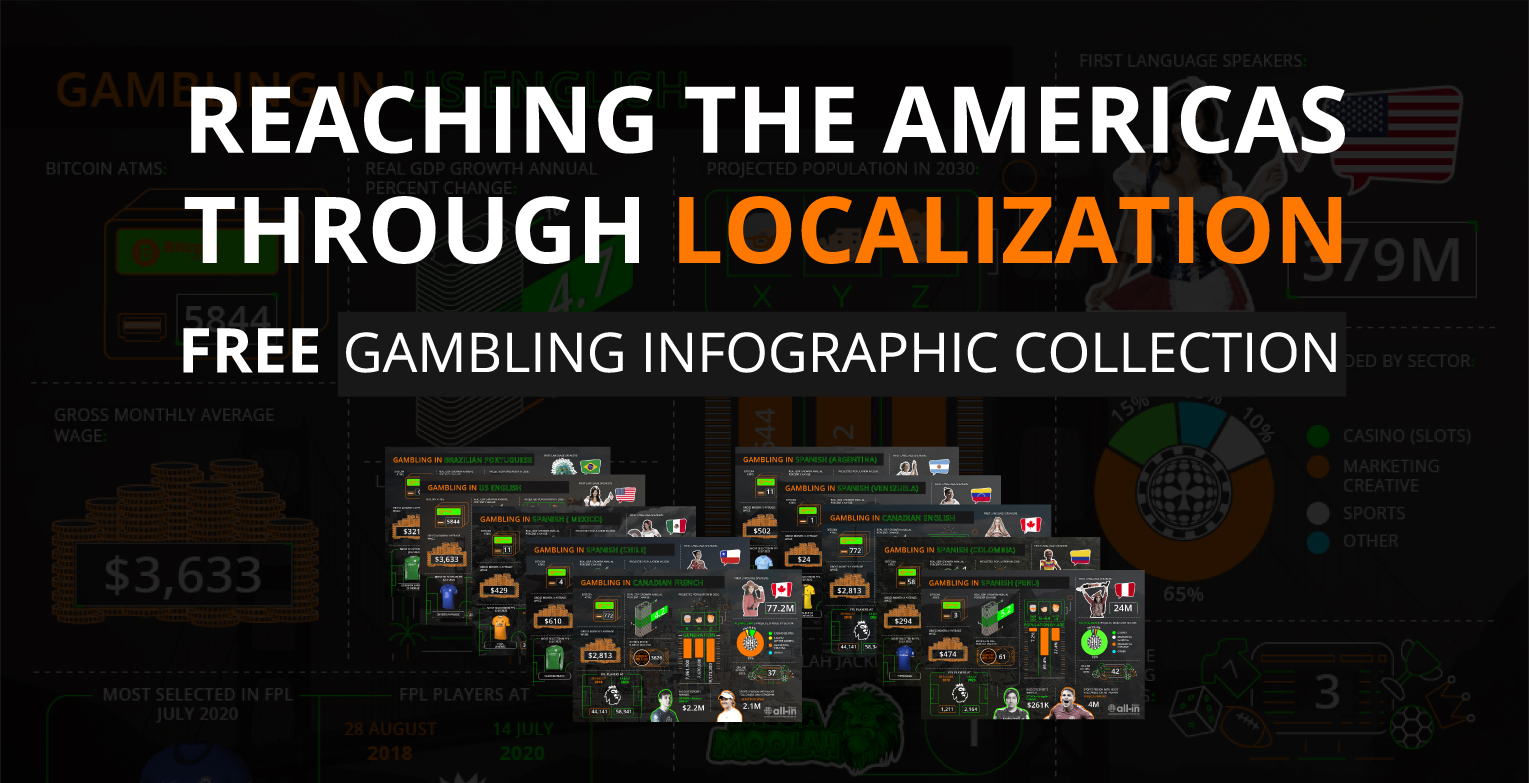
TOP WORLD CUP MARKETS AND THEIR LANGUAGES
Which World Cup countries have more market potential, and where lie the potential and pitfalls of language localisation?
All-In Translations is a Malta based language service provider specialising in iGaming. While counting down to the World Cup, they prepared a market analysis involving the 32 qualified countries, with the conclusive tagline: Betting is a bit like screaming for your country in the World Cup. Fans prefer to do it in their own language!
Key data were online gross gaming revenue, technology penetration, online behaviour, legality of online gaming and the linguistic landscape in each country. This article sums up the key findings and presents some interesting considerations for gaming companies looking for new players abroad, especially in the 8 countries that were ranked highest for market potential:
- Argentina -the sleeping giant of online gaming. No other country in South America has a higher percentage of Internet users purchasing online (71%), and no other country in the Southern hemisphere has higher annual gambling revenue. There was almost a 50% increase in eCommerce in 2013, and the Argentinian government has opened up for licensing of online casino gaming sites.
- Brazil has a population of more than 200 million, and a high percentage loves to play for money. There is no widespread national online betting legislation in place as of yet, but poker is now listed on the Ministry website as a sport.
- Japan is one of the biggest gaming markets in the world, but almost all forms of gambling in Japan are regulated by the local governments with a hefty house edge. Naturally the Japanese are looking for places to play online, and there is a clear shift towards liberalisation of the gaming market.
- Mexico has a gaming market that may be worth some US$4.6 billion. 2004 legislation allowed online gaming and there are very few restrictions on advertising.
- Russia and the Russians are number 1 in the world for PC gaming. Now, online gaming has finally started to grow like a snowball as well, reminding us of the Russian saying “A Russian would very slowly prepare his horse for riding, but once it is ready, the ride will take your breath away”.
- Ghana is expected to have one of the world’s top 10 fastest growing economies from 2012 to 2015. The Internet connection is ranked as fastest in Africa and Ghana is number 1 in Africa for mobile broadband and smartphone penetration. Gambling is legislated online as well as offline.
- Colombia had an annual B2C online spend in 2013 equal to that of Mexico ($1.2 billion), and better yet there are no laws against playing on VPN-friendly online casinos or offshore casino sites registered abroad.
- In Nigeria, there is no doubt where the market potential lies: mobile gaming. Statistics show 48.1 million active internet subscriptions through mobile phone networks and a 30% smartphone penetration. According to a survey carried out by MasterCard, 92% have a strong and positive sentiment towards online shopping.
Numbers presented by the Common Sense Advisory showed that 72.4% of consumers are more likely to buy something online when the information is available in their own language. High quality gaming translation is not cheap, but the language landscape in many of the most promising countries allows localisation at a fraction of full translation prices.
Let us illustrate with an example: You have a mobile gaming site of 1000 words (in UK English) and have decided to target players in these 8 countries. What is your next step? We recommend that you involve your linguists early in the process, no matter if you have in-house language personnel or if you are outsourcing. Why? Because we can foresee potential as well as pitfalls, allowing you maximise on every cent spent and eliminate the need of rework.
Pitfalls: Most languages are considerably longer than English. For instance, you would want to design the buttons on your mobile gaming site in a way that allows longer words than in the English version, as shortening of words can often be awkward as well as a source of misunderstanding. Also, a Japanese linguist could tell you that in Japan the colour red can connote anger and danger, whereas pink is well liked by both males and females.
Potential: If we were involved early in the localisation process, that would hopefully mean that you have scheduled some time to finalise. We CAN deliver within 24 hours, but if we had e.g. a week at our disposal, we would recommend the following steps:
- Translate this content into European Spanish, Brazilian Portuguese, Japanese and Russian.
- Once these translations are ready, you can localise at low-cost into Argentinian Spanish, Mexican Spanish and Colombian Spanish. We would even add Chilean Spanish and European Portuguese as they both have a considerable market potential (13th and 17th on the list). This applies also for Ghana and Nigeria, where English is the official language, but a slightly adjusted localised version will make the content more trustworthy and “home like” for the target audience.
- Upload all the language versions to your mobile gaming site and send the pages for post-editing before launching; meaning the translations would be proofread in their full context.
Bottom line: By translating into four languages (Brazilian Portuguese, Spanish, Japanese, Russian) and making localisation adjustments into another seven languages (European Portuguese, Argentinian Spanish, Mexican Spanish, Colombian Spanish, Chilean Spanish, Ghanaian English, Nigerian English) you would potentially reach almost 400 million adult Internet users in their own language, compared to just 44 million in the already saturated market of the UK.
1000 words in 11 languages add up to 11000 words. However, 7000 of these words could be considered as localisation adjustments rather than translations, which would give you about 65% reduction of price.
So what would be the total price of having this mobile gaming site accurately localised, including full-context editing, into the 11 languages of the most promising gaming markets in the world? Less than €1K.

